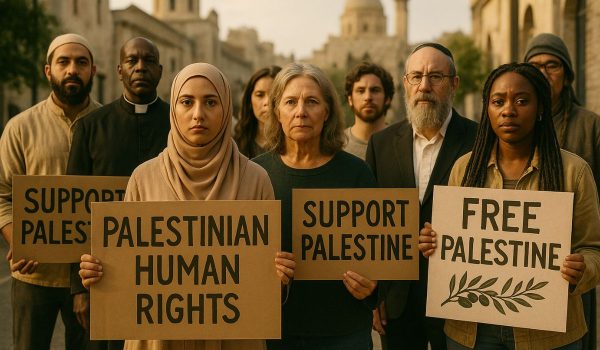The movement for Palestinian rights has often found strength in unlikely partnerships. Across faith traditions, people are coming together to support justice, dignity, and human rights for Palestinians. These interfaith efforts are built on shared values—compassion, truth, and the belief that every person deserves to live in safety and freedom.
Whether through prayer services, public advocacy, educational panels, or solidarity delegations, faith communities are playing an active role. Their involvement adds moral weight to the conversation and helps shift the focus from politics to people. This work is growing steadily and making a difference on the ground and in public perception.
What This Article Covers About Interfaith Support
This piece offers a thoughtful look at how different religious groups are working together to support Palestinian rights:
- Why faith-based efforts matter in justice movements
- How Christian, Jewish, Muslim, and other communities are uniting for shared goals
- Key moments and campaigns that brought diverse faith leaders together
- The challenges and lessons that come with interfaith work
- Practical ways faith groups continue to show up for Palestinian dignity
These stories reflect not only the diversity of belief but also the power of collective action rooted in moral conviction.
Shared Values Make Room for Common Ground
People from different religions often have different histories, customs, and theological views. But when it comes to human dignity, the right to live free from violence, and the call to protect the oppressed, there is plenty of common ground.
For many Christians, supporting Palestinian rights connects with biblical teachings about justice and caring for the marginalized. In some Jewish communities, it aligns with a deep tradition of social justice and the principle of tikkun olam—repairing the world. For Muslims, the call to solidarity with oppressed peoples is embedded in faith and practice.
These shared values offer a strong foundation for collaboration. Rather than setting aside differences, interfaith groups build on mutual respect and focus on the common goal: freedom and dignity for Palestinians.
Examples of Interfaith Partnerships
Several organizations have led the way in building bridges between faith groups for the Palestinian cause. These efforts go beyond symbolic gestures—they’re rooted in action, dialogue, and public advocacy.
One powerful example is joint statements from religious leaders. Clergy from different traditions have signed open letters urging governments to take meaningful action, calling for an end to occupation, home demolitions, and displacement.
In some cities, interfaith coalitions host community forums and teach-ins where speakers from different backgrounds share their perspectives on the situation in Palestine. These events allow for honest conversations and help people understand how their own traditions connect to broader struggles for justice.
Pilgrimages and solidarity trips have also played a role. When groups visit Palestinian communities together, they return home with a deeper understanding of the daily realities people face. These shared experiences can be transformative, not just for individuals, but for the communities they serve.
Faith and Advocacy Go Hand in Hand
Interfaith efforts have helped amplify grassroots movements. For example, religious groups have participated in boycotts of companies involved in settlement expansion. They’ve written letters to political leaders and passed resolutions in church synods, mosques, and temples.
Some of the strongest support comes from local congregations. These communities host film screenings, organize fundraisers for Palestinian schools and clinics, and hold prayer vigils during times of crisis. Their support is quiet but steady, often rooted in personal relationships or long-standing international partnerships.
In academic spaces, student-led faith groups sometimes invite speakers or organize interfaith dialogues that center Palestinian voices. These conversations are especially powerful in settings where misunderstandings about the conflict are common.
Difficult Conversations and Real Growth
Working across faith lines isn’t always easy. Some participants worry about offending others or stepping into sensitive theological areas. Others fear being labeled or misunderstood for speaking up.
But these tensions are part of the process. They force communities to ask hard questions, revisit assumptions, and build trust through dialogue.
Sometimes, interfaith work means pushing back against institutions or leaders within one’s own tradition. It takes courage to speak out when your peers might not agree. But when that courage is rooted in conscience and connection, it can lead to meaningful change.
Faith leaders have played a role in challenging their own communities to reconsider old narratives and listen to Palestinian voices. These efforts often lead to deeper learning and more honest engagement.
Standing with Palestinian Communities
Interfaith partnerships also show up in moments of crisis. During escalations of violence or forced evictions, faith-based groups have joined protests, held public vigils, and issued statements of support.
But their work doesn’t end when the news cycle moves on. Long after the cameras leave, these coalitions continue supporting community projects, education initiatives, and advocacy efforts that aim to create lasting change.
They help raise funds for rebuilding efforts. They create space for interfaith youth leadership programs that train the next generation in justice-centered dialogue. And they bring attention to voices that are too often ignored in mainstream discussions.
The Road Ahead for Interfaith Solidarity
The struggle for Palestinian rights is complex and ongoing. But interfaith efforts offer a steady source of hope. They remind us that people of different beliefs can stand together without losing their own identities.
This kind of unity doesn’t come from forced agreement. It grows from shared purpose, careful listening, and a commitment to justice that crosses boundaries.
When people of faith come together—not just to talk, but to act—they can help build a world that reflects the values they preach. In the case of Palestine, that means working for freedom, dignity, and the right for all people to live without fear.
These efforts won’t solve everything overnight, but they offer a meaningful path forward—one rooted in courage, compassion, and community.

